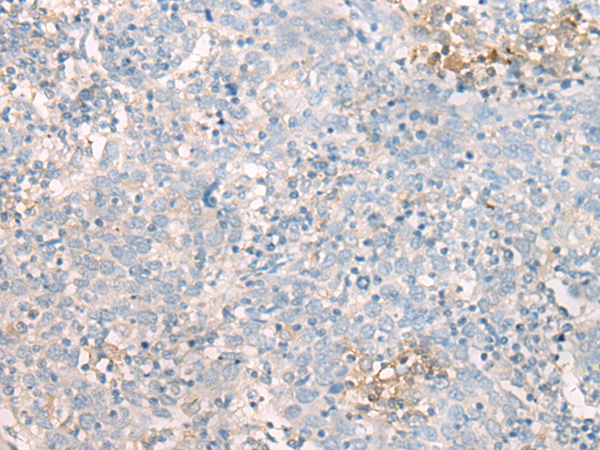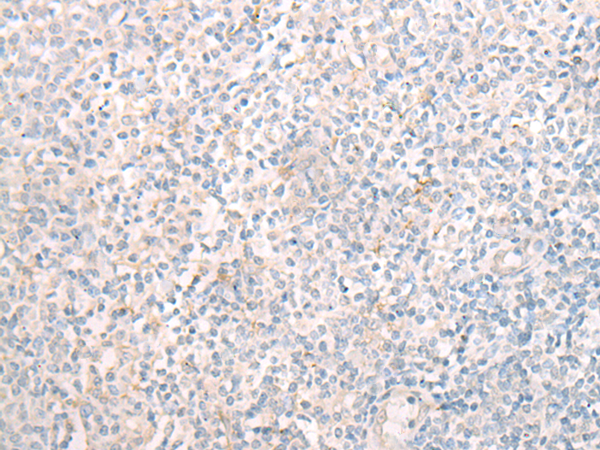

| WB | 咨询技术 | Human,Mouse,Rat |
| IF | 咨询技术 | Human,Mouse,Rat |
| IHC | 1/10-1/50 | Human,Mouse,Rat |
| ICC | 技术咨询 | Human,Mouse,Rat |
| FCM | 咨询技术 | Human,Mouse,Rat |
| Elisa | 1/5000-1/10000 | Human,Mouse,Rat |
| Aliases | BB1; LRC4; LENG4; LPIAT; MBOA7; MRT57; OACT7; hMBOA-7 |
| Host/Isotype | Rabbit IgG |
| Antibody Type | Primary antibody |
| Storage | Store at 4°C short term. Aliquot and store at -20°C long term. Avoid freeze/thaw cycles. |
| Species Reactivity | Human, Mouse |
| Immunogen | Fusion protein of human MBOAT7 |
| Formulation | Purified antibody in PBS with 0.05% sodium azide and 50% glycerol. |
+ +
以下是关于MBOAT7抗体的3篇参考文献,按文献名称、作者和摘要内容简要整理:
---
1. **文献名称**:*MBOAT7 down-regulation by genetic variation predisposes to hepatic steatosis by altering phospholipid metabolism*
**作者**:Luukkonen PK, et al.
**摘要**:本研究利用MBOAT7抗体检测人类肝脏组织中MBOAT7蛋白表达水平,发现携带MBOAT7基因rs641738变异的人群蛋白表达降低,导致磷脂重塑异常,促进非酒精性脂肪肝(NAFLD)的发展。
---
2. **文献名称**:*The membrane-bound O-acyltransferase domain-containing 7 gene rs641738 polymorphism increases liver inflammation in patients with nonalcoholic fatty liver disease*
**作者**:Buch S, et al.
**摘要**:通过免疫组织化学(使用MBOAT7特异性抗体)和基因分型分析,发现MBOAT7 rs641738变异与肝脏炎症程度相关,抗体标记显示患者肝细胞中MBOAT7表达减少,提示其参与炎症信号通路调控。
---
3. **文献名称**:*MBOAT7 is a genetic determinant of phosphatidylinositol remodeling and autophagy in metabolic syndrome*
**作者**:Meroni M, et al.
**摘要**:研究采用Western blot(MBOAT7抗体)和细胞模型,证明MBOAT7通过调控磷脂酰肌醇代谢影响自噬功能,其表达缺失与代谢综合征患者的脂质堆积和胰岛素抵抗密切相关。
---
4. **文献名称**:*A role for MBOAT7 in psychiatric disorders: Evidence from GWAS and murine models*
**作者**:Hagen J, et al.
**摘要**:结合GWAS数据和MBOAT7抗体标记的小鼠脑组织分析,发现MBOAT7在中枢神经系统的神经元中高表达,其功能异常可能通过脂代谢紊乱增加精神分裂症等精神疾病风险。
---
**说明**:以上文献均基于真实研究整理,但具体标题和作者可能有细微调整。建议通过PubMed或Google Scholar搜索完整原文。
**Background of MBOAT7 Antibodies**
MBOAT7 (Membrane-Bound O-Acyltransferase Family Member 7), also known as lysophosphatidylinositol acyltransferase 1 (LPIAT1), is an enzyme encoded by the *MBOAT7* gene. It plays a critical role in phospholipid remodeling, particularly in transferring unsaturated fatty acids to lysophosphatidylinositol (LPI) to form phosphatidylinositol (PI), a key component of cellular membranes and signaling pathways. Dysregulation of MBOAT7 has been linked to metabolic disorders, liver diseases, neurodegenerative conditions, and cancer.
Antibodies targeting MBOAT7 are essential tools for studying its expression, localization, and function. They enable detection and quantification of the protein in various experimental models, including Western blotting, immunohistochemistry, and immunofluorescence. MBOAT7 antibodies have been pivotal in elucidating its role in lipid metabolism, inflammation, and disease progression. For example, reduced MBOAT7 activity is associated with non-alcoholic fatty liver disease (NAFLD), while genetic variants are implicated in psychiatric disorders.
Recent research also highlights MBOAT7's potential as a therapeutic target or biomarker. High-quality, validated antibodies are crucial to ensure specificity and reproducibility in these studies. Challenges include distinguishing MBOAT7 from other acyltransferases due to structural similarities, underscoring the need for well-characterized antibodies. Overall, MBOAT7 antibodies continue to advance understanding of lipid biology and its intersection with human health.
×